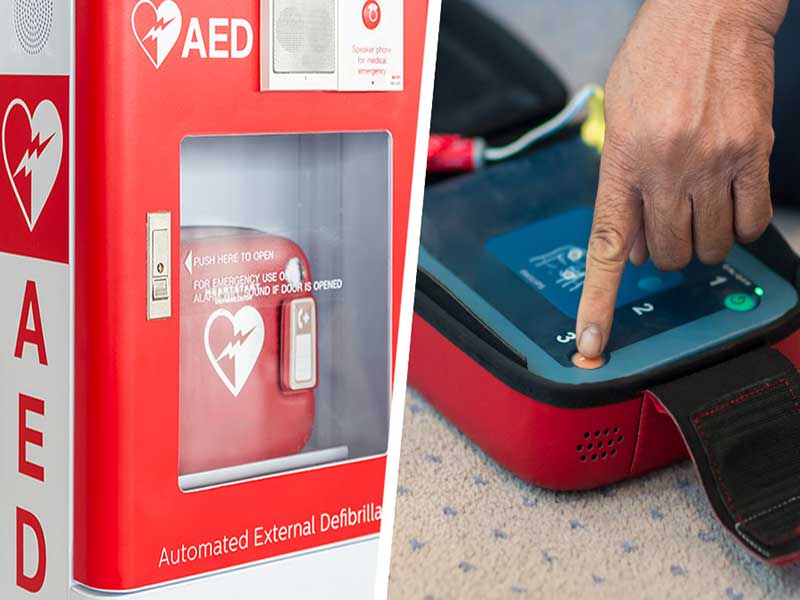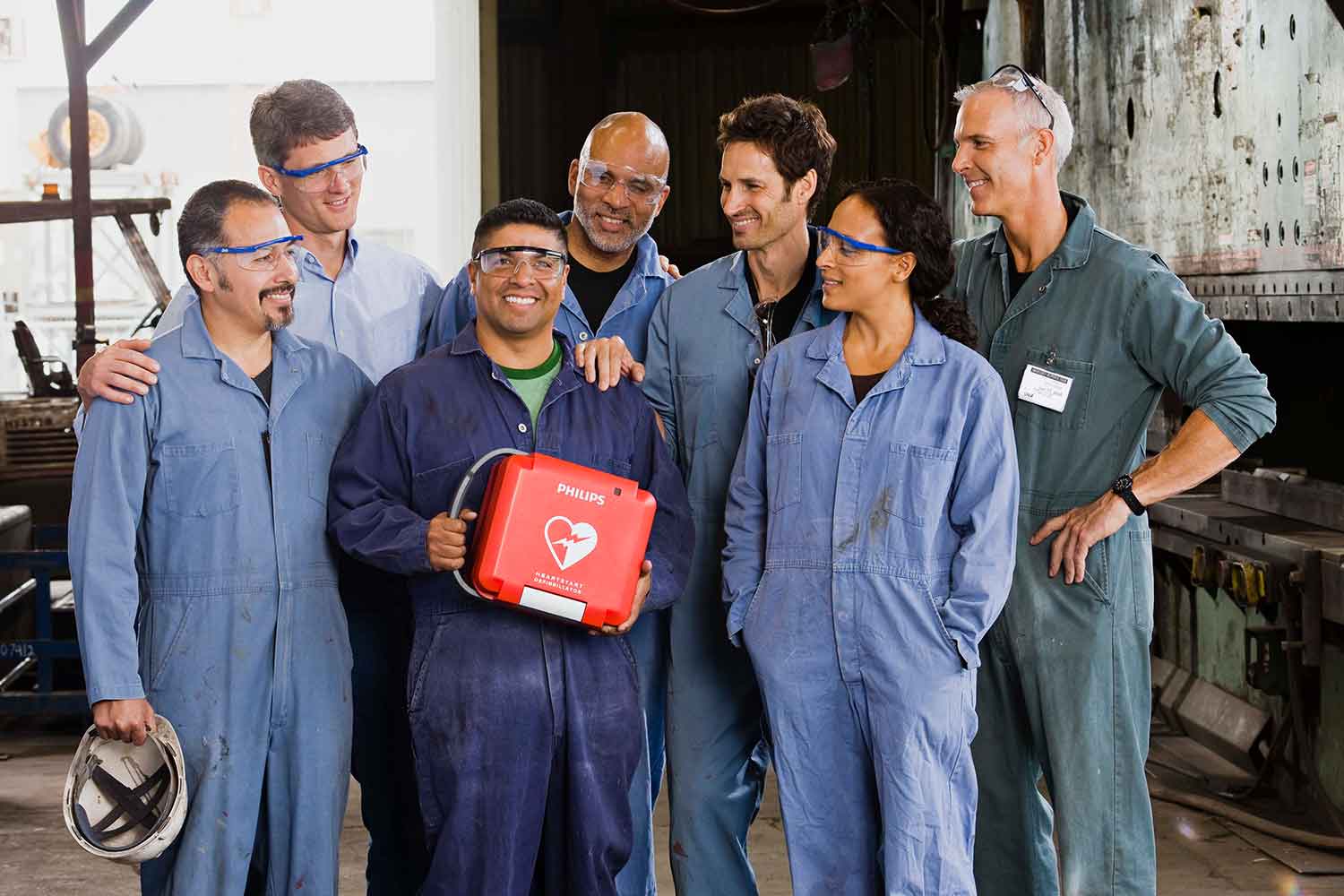A quick online search for automatic external defibrillator (AED) suppliers results in a dizzying array of options. It can feel overwhelming deciding where to buy this critical piece of equipment.
As more Public Access to Defibrillation (PAD) programs have been implemented, more public venues and private businesses have realized the need for having an AED accessible on the premises.
Manufacturers have stepped up the design of user-friendly models even non-medical personnel can use. As a result, there are more suppliers and retailers available to fulfill the increased need.
AEDs are designed with sophisticated technology that analyzes heart rhythm and only delivers a shock when necessary during a sudden cardiac arrest (SCA). You need to acquire a device that is not only safe and reliable, but also well maintained and arrives at the victim’s side quickly. A reputable distributor can assist you with meeting this goal.
From national online suppliers to local distributors, there are many AED sources to consider. The purchase of an AED is an important decision. Having a safe, reliable, easy-to-use AED that fits the needs of your business or organization can mean the difference between life and death.
AED sellers fall into four categories:
- National Online Resellers – there are a large variety of online retailers of AEDs. Some, such as Amazon and EBay, sell just about anything. There are sites that sell a single brand / model or just a few models. Others specialize in just AEDs and related supplies and services. Some online medical equipment dealers carry many different brands and types of medical equipment and supplies, of which AEDs make up just one line.
- Local Distributors – local AED distributors include independent distributors that carry only AEDs, CPR instructors who carry AEDs as an adjunct, and businesses that focus on a line of safety supplies that include AEDs.
- Large National Retailers – these include retailers such as Costco and Walmart.
- Non-Profit Organizations – a few offer AEDs, such as American Red Cross and Sudden Cardiac Arrest Foundation (through a distributor partner).
It is important to find a business that operates with integrity, knowledge and a moral, professional approach to business. Not all resellers of medical equipment are the same….and sometimes, neither is the equipment.
When choosing a distributor, you want to partner with a reputable distributor that offers variety, quality, customer-focus, industry experience, and overall value. With these parameters in mind, there are a number of questions to ask that will guide your decision.
Are you a factory-authorized dealer?
A factory authorized distributor (or dealer) is an individual or business that has the right to sell a specific manufacturer’s products, but not the right to use the company’s trade name as part of their business name.
There are several key benefits of buying from a factory-authorized distributor:
- The device and supplies are FDA approved.
- You receive prompt notification of device correction and/or critical recalls.
- You receive the full manufacturer’s device warranty and assurance that your warranty will be honored.
- You receive full device support from both the authorized distributor and the manufacturer in the event you have questions on the care or operation of your new AED.
- The distributor is trained by the manufacturer and can pass that expertise on to you.
- The distributor has to meet all manufacturer’s standards, from sales to service, in order to achieve and maintain authorized status.
Do you sell factory-new products?
Knowing you are buying a factory-new product ensures that you have a safe, reliable machine that is up-to-date according to FDA (Food and Drug Administration) guidelines.
In 2015, in an effort to strengthen its review of AEDs and improve the quality and reliability of the devices, the FDA issued an order requiring AED manufacturers to “submit premarket approval applications (PMAs), which undergo a more rigorous review than what was required to market these devices in the past. The agency’s strengthened review will focus on the critical requirements needed to ensure the safety and reliability of AEDs and their necessary accessories, including batteries, pad electrodes, adapters and hardware keys for pediatric use.”
This requirement allows the FDA to monitor manufacturer’s quality systems information, conduct inspections, oversee changes made to devices that affect safety or effectiveness, and receive annual reports on device performance.
If your budget allows, it is best to avoid refurbished (also known as reconditioned or recertified) AEDs available from some distributors. Active FDA oversight is only applicable on a device that is factory-new. The origin of that device is unknown – you have no idea how it was used and possibly abused prior to reconditioning.
Older models may not comply with current FDA standards. Few distributors use a vigorous quality process before reselling a refurbished device — many use no process at all. While the price tag may look great to your budget, the trade-off is that you may not be getting a device that will reliably protect your employees, customers and visitors.
How many different brands / models do you offer?
There are a number of manufacturers of AEDs, including Cardiac Science, Defibtech, HeartSine, Philips Healthcare, Physio-Control and Zoll Medical. Some distributors offer only one brand while other sell the gamut.
It is ideal to find a source that offers multiple brands and models, so that you can better find the AED that suits the needs of your business or organization. Working with a seller that offers multiple options means they can offer more guidance regarding the features and benefits of each model.
Offering a variety also allows sellers to offer AED packages geared to suit your type of business/organization.
What accessories do you sell?
To save you time and ensure reliability of your device, your distributor should carry high quality, original AED supplies from the manufacturer of your AED.
This allows you to have one go-to source for replacement supplies, peace of mind the supplies are cleared by the FDA, will work properly with your specific AED model, and are covered by the manufacturer’s warranty.
What is your expertise?
Industry knowledge and experience are extremely valuable when considering where to buy your AED. You want to work with a distributor you can trust and views your business relationship as a partnership.
It is important to work with a business that that can provide accurate answers and relevant guidance for your questions regarding clinical and legal concerns. You want a distributor who can expertly navigate you through the process of implementing your AED program.
Keep in mind that for some distributors, AEDs are only a small part of a huge inventory of other types of medical equipment. Others specialize in only AEDs – this specialization means that the business may be more knowledgeable about AEDs.
What kind of training support do you provide?
CPR / AED initial and refresher training are highly recommended as part of an AED program and may be required by your state. Some sellers offer this training for a discount or include it with purchase of a unit or package. Some may offer onsite training. Since this is an added cost for your program, it is important to find out.
What are my purchase options?
An AED is going to cost you $1,200 to $3,000 up front to purchase. Find out if the distributor offers financing options and /or an option to lease.
Financing may be necessary if you do not want to delay implementing a lifesaving AED program, but your current budget does not allow for the cash outlay. Another consideration is the option to lease vs. buy the equipment.
There are merits to either approach. If you purchase an AED, you own it and may experience tax benefits for a capital expenditure. Full ownership also means you have full responsibility for routine maintenance and inspection, required documentation, tracking and buying supplies, and keeping track of FDA compliance (recalls, updates).
The long-term cost of ownership is typically lower than leasing. The key is to have a program coordinator to manage your AED program.
Leasing may be a good option if you want an AED program without coordination hassles. Typically, leasing an AED comes with some amount of program management included, such as FDA recall protection and upgrades, replacement supplies, CPR / AED training, inspection, and medical direction. A lease arrangement offers a total solution so you have one source for training, support and maintenance.
Do you offer complimentary product demonstrations?
A product demonstration is a valuable tool in helping you to decide which model is best for your business. While an online retailer may only provide videos, a local distributor may provide a hands-on live demonstration and can address questions and concerns right on the spot.
What support services do your provide?
Personalized support services are key to the success of your AED program.
- On-site needs analysis — this service evaluates the environment in which the AED will be placed and used and makes specific product recommendations that suit your unique needs.
- Unit placement – this service provides placement of AED and device orientation and training.
- Program implementation / On-going support – this may include resources/services for training, documentation, tracking replacement supplies, and availability for questions/issues.
- Medical direction / oversight resources — Many states require a prescription and/or medical oversight of your AED program by a physician. Find out what support or guidance the supplier provides.
Resources
http://www.fda.gov/NewsEvents/Newsroom/PressAnnouncements/ucm431907.htm


